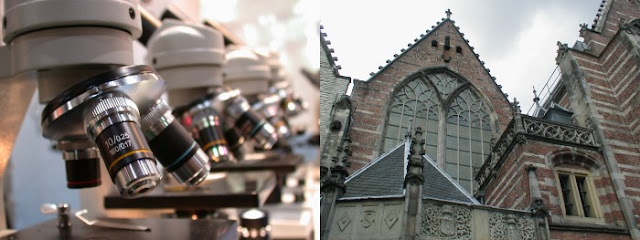Conflicting Views and the Brain
Secularists are contradicting themselves by saying that there's a brain-based conflict"between "science" and "religion", and then try to find the source of free will in the brain, and also claim to know about ethics. Free will and ethics are spiritual concepts, and indeed, these naturalistic owlhoots conveniently ignore the fact that atheism itself is a religion, both legally and philosophically.
Scientists are mighty arrogant these days, making assertions about things that they really are only beginning to understand. There are naturalistic underpinnings in studies, contradictions, and problems with definitions (such as the key words here, science and religion, since science is a philosophy of interpreting evidence). Science gets presented in churches, that should cause a naturalist some cognitive dissonance. Further, Christians are commanded to love God with our minds as well as heart, soul, and strength.
Worse, bigotry rears up and, using convenient word games, insultingly asserts that biblical creationists have nothing to contribute to science. Some of the greatest thinkers have been Bible-believing Christians, many were and are six-day creationists. Meanwhile, atheists have been known to assert that they are by default more intelligent than Christians, and then promptly throw a passel of logical fallacies to "prove" it.
 |
| Credits: Image*After |
Worse, bigotry rears up and, using convenient word games, insultingly asserts that biblical creationists have nothing to contribute to science. Some of the greatest thinkers have been Bible-believing Christians, many were and are six-day creationists. Meanwhile, atheists have been known to assert that they are by default more intelligent than Christians, and then promptly throw a passel of logical fallacies to "prove" it.
Since the “Decade of the Brain” in the 1990s, an increasing number of scientists and philosophers believe that there is no aspect of our lives that neuroscience cannot, in principle, help to illuminate. Unfortunately, and sadly, the interpretation of neuroscientific information about us is often surrounded by a fog of illogic and confusion. Clearing up the fog requires, among other things, careful scrutiny of the researchers’ basic assumptions; eradication of incoherent assertions, inconsistencies, and conceptual confusions; and an examination of conclusions and implications in the light of Scripture.To read the rest of Dr. Joubert's article, click on "Are Conflicting Beliefs Tied to the Brain?". You may also be interested in one of his related technical papers, "Scientific Evidence Indicates Natural Selection and Brain-Based Education Conflict with Human Nature". Of a less technical nature but still very informative, the 28-minute video, "Logic, reason and Christianity".
A case in point is a news article in the March 23, 2016, ScienceDaily. This article presents research results that purportedly found the cause for the conflict between science and religion in the brain. According to the article, it “is perhaps most visible today in the arguments between evolution and creationism.” In a nutshell, scientists discovered two networks or structures in the brain, one associated with analytical thinking and science (naturalism and materialism), and the other with religion (emotion and moral concern). These networks, we are informed, are in “tension” or “competition.” So when someone thinks analytically and critically about the world (i.e., scientifically) then the network associated with it “suppresses” the network associated with religious beliefs (i.e., religion), and vice versa.